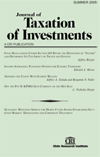Using Insurance-Related Strategies for Non-U.S. Investor Private Market Investments
Author: Mark Leeds.
Source: Volume 39, Number 04, Summer 2022 , pp.3-26(24)

next article > |return to table of contents
Abstract:
As many investors throughout the globe adjust their portfolio construction methodologies to include a greater allocation to alternative investments, there’s been a strong and increasing flow of foreign investment capital into the U.S. private markets. For non-U.S. investors investing in U.S. assets, the U.S. tax landscape can be exceedingly complex, and potentially very costly (up to 44.7 percent of profits). Foreign investors, and their tax and legal advisors, have traditionally relied upon various forms of corporate “tax blockers” to help mitigate the impact of U.S. taxation, and avoid the need to file U.S. tax returns. In 2016, non-U.S. investors began employing an insurance-related structure—known as a deferred variable annuity (DVA) policy—that can more effectively mitigate the U.S. tax burden than a corporate tax blocker, while avoiding the need to file U.S. tax returns. This article explains the operation of the DVA structure, and how it compares to corporate and leveraged corporate tax blockers, for asset managers, institutional investors, family offices and their advisors who may not yet be familiar with this investment structure.Keywords: effectively connected income, FDAP income, FIRPTA, branch profits tax, U.S. tax withholding, unleveraged corporate blocker, leveraged corporate blocker, deferred variable annuity, Luxembourg Reserved Alternative Investment Fund (RAIF)
Affiliations:
1: Mayer Brown LLP.